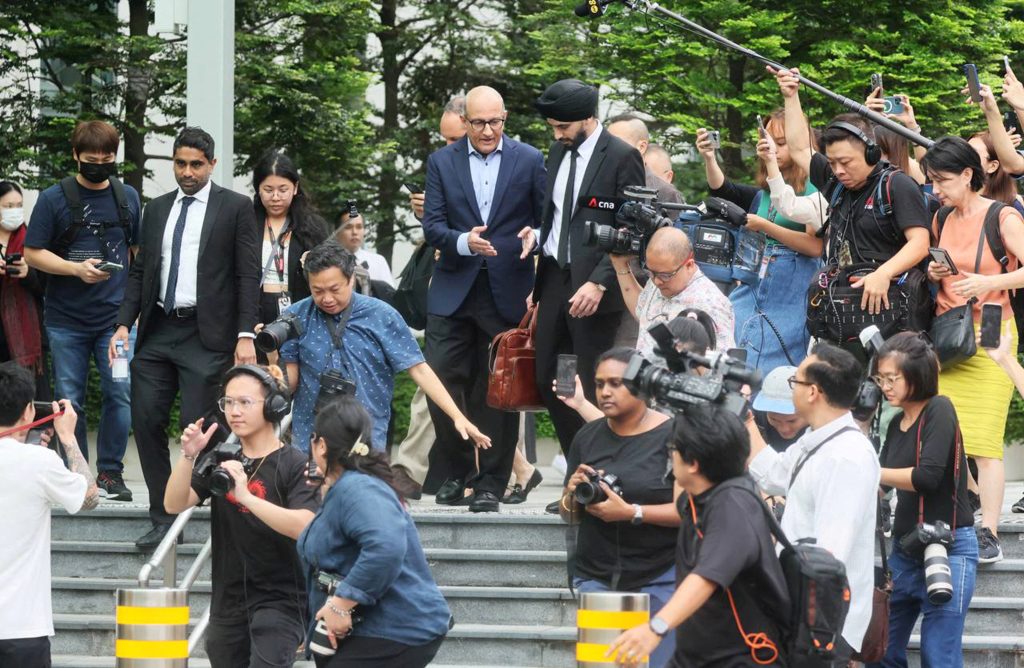Last year was unprecedented in independent Singapore’s history. Difficulties have arisen in past years for the government, the economy, specific sections of the Singaporean populace or in terms of escalating repression, but 2023 encompassed all the above. Recovering Singapore’s reputation for clean governance will not be an easy task.
In January 2023, six executives of Keppel Corp, a government linked company, were found by the US Department of Justice to have paid US$55 million in bribes to win contracts with Brazilian oil giant Petrobras. When the case reached Singapore, however, the Corrupt Practices Investigation Bureau (CPIB) declined prosecuting or even identifying the culprits due to ‘lack of evidence’, issuing ‘stern warnings’ to the ex-Keppel executives instead.
In May 2023, two cabinet ministers fended off opposition suggestions that they had received special treatment when securing leases for luxury state-owned bungalows. It was especially awkward for Home Affairs and Law Minister K Shanmugam as the properties, which were part of his ministerial portfolio, had been leased to the ministers without undergoing a competitive tender process. In the course of his defence, Shanmugam disclosed that he was paying a monthly rent of S$26,500 — an explanation unlikely to win him much sympathy from ordinary Singaporeans living in public housing and facing a cost of living crisis.
Come July, investigations by the CPIB and former deputy prime minister Teo Chee Hean cleared both ministers of any impropriety. But by then, Singaporeans were already reading about the next scandal — the CPIB’s arrest of Minister for Transport S Iswaran, on corruption charges related to Singapore’s successful bid to host the Formula One Grand Prix.
A week after the Iswaran story broke, the Speaker of Parliament and former prime ministerial aspirant Tan Chuan-Jin resigned over an extra-marital affair with another government MP, Cheng Li Hui, who also resigned. Prime Minister Lee Hsien Loong admitted that he had known about the affair for years, but he did not seem overly concerned until early 2023, by which time Tan had become a liability for different reasons. Prime Minister Lee then allowed Tan to remain in parliament as Speaker for months after he had accepted his resignation.
On the same day that Tan’s affair was made public, years-old vision filmed with a hidden camera in a restaurant was anonymously posted on social media, showing an adulterous couple from the opposition Workers’ Party (though only one an MP) holding hands. This prompted some commentators to claim a degree of comparability with the Tan Chuan-Jin story without questioning the source or timeliness of the revelations.
A multi-billion-dollar money laundering case broke in mid-August, resulting in the arrest of ten young China-born millionaires who had built their fortunes on gambling and online fraud. They had blended quietly into the background by living like other millionaires, including holding membership of the prestigious Sentosa Golf Club and Singapore Island Country Club — both of which have been favoured by members of the political establishment for many decades.
It could be difficult for Singapore’s international reputation to recover from these scandals, but the government is doing its best to block domestic access to critical analysis of these scandals through legislation such as the Protection from Online Falsehoods and Manipulation Act. Yet another plank of the legislative framework of domestic censorship was enacted in December 2023 – FICA, the Foreign Interference (Countermeasures) Act. The government’s reflexive responseto crises has thus increasingly been to silence and intimidate critics, whether it be opposition leaders who investigategovernment ministers, critical commentators or those engaged in more personal attacks.
This marked the first year since 1996 that an investigation into corruption, or even impropriety, has impacted a cabinet minister. In 1996, then-prime minister Goh Chok Tong and finance minister Richard Hu personally investigated and cleared senior minister Lee Kuan Yew and deputy prime minister Lee Hsien Loong of any wrongdoing when they each accepted million-dollar discounts on a condominium development from a property developer. The same property developer was recently questioned by CPIB as part of the 2023 Iswaran investigation.
The Singaporean government would undoubtedly prefer to forget 2023. Still, it ended the year with news of generational leadership change, smoothing the way to the next general election which is scheduled for late 2025. Former deputy prime minister Tharman Shanmugaratnam was elected president with 70 per cent of the national vote after a popular alternative candidate was ruled ineligible. Prime Minister Lee Hsien Loong subsequently indicated he will hand over to his designated successor, Deputy Prime Minister Lawrence Wong, sometime in 2024 ‘if all goes well’.
The government also announced a series of ultra-cautious welfare and housing measures aimed at helping the working poor, older Singaporeans and those who own flats of diminishing value in old housing estates.
It remains to be seen if these micro-reforms will be sufficient for the People’s Action Party to retain its current votes and seats in the upcoming general election. It is certainly an inauspicious time for a new leader to take over. Not that Wong will be alone — he will undoubtedly be aided by Lee Hsien Loong as senior minister, and perhaps Shanmugam as deputy prime minister.
Michael Barr is Associate Professor of International Relations at Flinders University. He is author of ‘The ruling elite of Singapore: networks of power and influence’ and ‘Constructing Singapore: Elitism, Ethnicity and the Nation-Building Project’.
This article is part of an EAF special feature series on 2023 in review and the year ahead.


You miss out one glaring and most important issue. Tharman is in effect an illegal president. He stood for election without stepping down from his position as a director in WEF Trustee. The Singapore Constitution specifically requires candidates to hold no foreign positions. When challenged, Tharman steadfastly said he will not step down from the WET Trustee appointment. After the election, the government then passed an amendment to the Constitution to allow the president to hold foreign appointments, and the change to have retroactive effect.